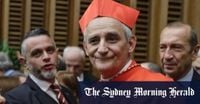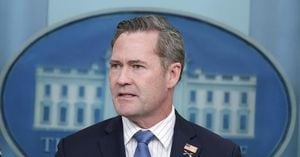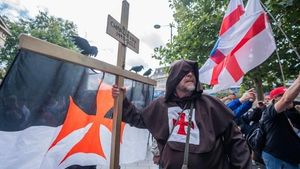As the 2025 Papal Conclave commences, Cardinal Matteo Zuppi emerges as a prominent contender to succeed Pope Francis, whose recent passing has left a significant void in the Catholic Church. The 69-year-old Archbishop of Bologna, affectionately known as "Don Matteo," has a compelling narrative that resonates with many, especially given his commitment to social justice and peace.
Zuppi's career reflects a deep-rooted dedication to service, beginning as a "street priest" in Rome's Trastevere district, where he ministered to the marginalized. This early work aligns closely with Pope Francis's emphasis on outreach and compassion. His notable achievements include serving as a key negotiator in ending Mozambique's civil war and acting as a peace envoy in Ukraine, where he was involved in efforts to secure the release of Ukrainian children taken during the ongoing conflict.
His progressive views, particularly his welcoming stance towards LGBTQ+ Catholics, further position him as a continuity candidate who could carry forward Pope Francis's legacy. Zuppi's close ties to the Community of Sant'Egidio, a Catholic group focused on peace and social justice, further emphasize his commitment to these values. He even wrote the introduction to the Italian translation of "Building a Bridge," a book advocating for greater LGBTQ+ inclusion within the Church.
As the conclave unfolds, Zuppi's candidacy is seen as a pivotal moment for the Catholic Church. His election would signal a continuation of Francis's progressive reforms, emphasizing inclusivity and social justice. However, the outcome remains uncertain, with other strong contenders such as Cardinal Pietro Parolin and Cardinal Luis Antonio Tagle also vying for the papacy.
On the evening of May 8, 2025, white smoke ascended from the Sistine Chapel chimney, announcing the election of the 267th pope. The newly elected pontiff's identity and chosen name will soon be revealed from the balcony of St. Peter's Basilica, followed by their first public address and blessing. Among the contenders is Cardinal Matteo Zuppi, who has garnered attention due to his rapid advancement under Pope Francis.
After being appointed to lead the affluent Archdiocese of Bologna in 2015, Zuppi was elevated to cardinal in 2019. His affiliation with the Sant’Egidio Community, a Rome-based Catholic charity, has been influential under Francis, particularly in interfaith dialogue. Zuppi's role in negotiating the end of Mozambique's civil war in the 1990s and his subsequent appointment as Francis's peace envoy for the war in Ukraine underscore his diplomatic skills and commitment to humanitarian efforts.
In this role, Zuppi traveled to Kyiv and Moscow after Ukrainian President Volodymyr Zelensky appealed to the Holy See for assistance in securing the release of 19,000 Ukrainian children taken from their families. His peace mission extended to China and the United States, showcasing his global reach and influence.
As the conclave progresses, Zuppi's candidacy has sparked considerable speculation, especially among Italians who have a historical connection to the papacy. For centuries, popes were predominantly Italian, with 213 of the 266 popes throughout history hailing from Italy. This trend shifted in 1978 with the election of Pope John Paul I, marking a new era where the papacy became more global.
Despite the internationalization of the papacy, many Italians still cherish the idea of a homegrown pope. A recent survey by Italian consultancy firm Izi found that over 74 percent of respondents prefer a pope who would maintain continuity with Francis's progressive approach, focusing on peace, poverty, and rejecting rearmament. While the desire for an Italian pope remains strong, 60 percent of Italians expressed indifference to the nationality of the next pontiff.
Among the other prominent candidates are Cardinal Pietro Parolin, the Vatican's Secretary of State, and Cardinal Pierbattista Pizzaballa, the patriarch of Jerusalem. Parolin is viewed as a seasoned diplomat, while Zuppi is recognized for his pastoral approach and reputation for mercy. Each candidate brings unique qualities that reflect Italy's desire to restore its influence in the Vatican.
However, the recent internationalization of the papacy has tempered expectations for an Italian pope. Dr. Claudio Betti, director of the Rome Campus of the Australian Catholic University, noted that the current conclave is the most challenging yet, as younger non-Italian candidates could lead the Church for decades, shaping its future beyond any Italian candidate's tenure.
As Zuppi navigates the media frenzy surrounding his candidacy, he remains humble. On the eve of the conclave, he humorously remarked to reporters that he was heading to his barber, poking fun at the intense scrutiny he faces. His approachable demeanor, coupled with a focus on outreach to the faithful, has earned him strong support, particularly in Rome.
Alfredo Bonelli, who runs a newspaper kiosk near the Basilica of Santa Maria in Trastevere, described Zuppi as "an exceptional person," highlighting his down-to-earth persona. Zuppi's reputation as "Francis 2.0" reflects his alignment with the late pope's values, particularly in ministering to those on the margins.
As the conclave continues, the question remains: will Italy's hopes for a homegrown pope be realized, or will the globalized nature of the Church shape its future? The answer is uncertain, but for now, the hope lives on. The world watches closely, eager to see who will lead the Catholic Church into the future, with Zuppi representing a potential bridge between tradition and progress.




